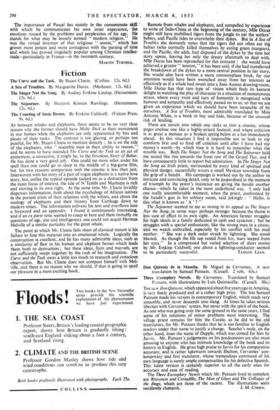Fiction
As between whales and elephants, there seems to be no very clear reason why the former should have Moby Dick as their monument in our homes while the elephants are only represented by bits and pieces of their tusks. The contrast is too glaring, or perhaps too painful, for Mr. Stuart Cloete to mention directly ; he is on the side of the elephants, who " resemble man in their ability to reason," and he seems to have intended The Curve and the Tusk as an act of atonement, a corrective, it might be, to the frivolous Story of Babar. He has done a very good job. One could no more relax under his spell than one could go to sleep in the middle of a big-game film, but for two reasons comparison with the cinema is less than just. Interwoven with his story of a pair of rogue elephants is a native love story, but, unlike the typical episode tacked on as a distraction from the main focus of interest, the tale of N 'Tembi and Mashupa is rich and moving in its own right. At the same time Mr. Cloete lavishly dispenses information, both about the psychology of African natives in the present crisis of their relations with the whites, and about the zoology of elephants and their history. from Carthage down to modern times. The information enlivens his text and overflows into a foreword and an appendix. I found it continuously interesting, and if an ex parte tone seemed to creep in here and there (notably on questions of age, size and intelligence), one could not acquit-Herman Melville of a similar partiality for the great whale.
The point at which Mr. Cloete falls short of classical stature is his failure to fuse this material into an emotional whole. - Logically the construction is excellent, and lie has many admirable ideas, such as a similarity of flaw in his huMan and elephant heroes which leads them both to destruction ' • but these ideas, facts and marvels, are not sufficiently swept together by the,rush of his imagination. The Curve and the Tusk owes a little too much to research and conscious observation. But Mr. Cloete does not compare himself with Mel- ville, and there is no reason why we shOuld, if that is going to spoil our pleasure in a most exciting book. Remote from whales ansfelephants, and compelled by experience ' to write of Indo-China at the beginning of the century, Mlle Duras might still have mobilised tigers from the jungle to eat the settlers' babies, and Pacific tides to overwhelm their dykes. But in A Sea of Troubles she demurely notes that the tigers did not often eat this babies (who normally killed themselves by eating green mangoes), and the Pacific, she adds, had disposed of the dykes by the time her story opens, leaving her only the dreary aftermath to deal with. -Mlle Duras has been reproached for this restraint : she would have achieved a greater " tension," it has been said, if she had transferred the breakdown of the dykes to a more central position in her story. She would also have written a more commonplace book, for our attention would have been wrenched away from her interests as effectively as if a whale had swum into a Jane Austen drawing-room. Mlle Duras has that rare type of vision which finds its keenest delight in watching the play of character in a situation of monotonous strain, where every twist and turn of humanity is recognised with humour and sympathy and effectively passed on to us, so that we are given an experience which we should have been incapable of by ourselves. A Sea of Troubles, most admirably translated by Miss Antonia White, is a book to buy and hide, because of the unusual risk of lending.
There are novels into which one sinks as into a cinema, whose pages enclose one like a highly-priced fauteuil, and where criticism is as great a menace as a broken spring below or a hat immediately ahead. In this situation I find it impossible not to look to my comforts first and to fend off criticism until after I have had my money's worth—by which time it is hard to remember what the trouble was. Both The Singer Not the Song and The Sojourner held me seated like this towards the front row of the Grand Tier, and I have consequently little to report but admiration. In The Singer Not the Song an Irish priest, surrounded by every kind of spiritual and physical danger, successfully wrests a small Mexican township from the grip of a bandit. His campaign is worked out by the author in intricate and convincing detail, only to be jeopardised in the moment of triumph by the priest's insistence on giving the bandit another chance—which he takes in the most underhand' way. I only had one really uncomfortable moment, when the priest, confronted by the bandit's gun in his solitary room, said jokingly : " Hallo, is thiS what is known as it ' ? "
The Sojourner seemed-to me as strong in its appeal as The Singer. Not the Song, in some ways perhaps stronger because the theme is legs sure- of effect in its own right. An American farmer struggles for high ideals in a family dedicated to cash and cynicism ; but he .steuggles-with a special enthusiasm, like the strong man in a circus, and we- watch enthralled, especially by his conflict with his mad Mother. " She was a dark cedar struck by lightning. She stood blasted. As though the life sap oozed from her, tears seeped from her eyes." In 'a compressed but varied selection of short stories by .Mr. Erskine Caldivell; one about a lightning-conductor seemed


































 Previous page
Previous page